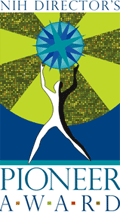 NIH recently conducted an evaluation of the short-term outcome of the NIH Director Pioneer’s Award program, which started in 2004 and is managed by NIGMS. The report was positive and confirmed that the research supported by the program truly has been pioneering, not only in pursuing highly creative and often unconventional approaches but also in leading to additional “high-risk, high-reward” programs at NIH and other funding agencies.
NIH recently conducted an evaluation of the short-term outcome of the NIH Director Pioneer’s Award program, which started in 2004 and is managed by NIGMS. The report was positive and confirmed that the research supported by the program truly has been pioneering, not only in pursuing highly creative and often unconventional approaches but also in leading to additional “high-risk, high-reward” programs at NIH and other funding agencies.
We hope to see many more highly innovative ideas submitted for the next Pioneer Award application cycle that is now under way. Applications are due October 7, 2011.

The NIH Director’s New Innovator Award program, also managed by NIGMS, is accepting applications until October 14, 2011. This program is designed for early stage investigators at U.S. institutions who have not yet obtained an NIH R01 or similar grant.
For more information and links to the requests for applications, see the Pioneer Award Web site and the New Innovator Award Web site.
As I’ve written before, one of my favorite elements of these programs is the annual symposium, scheduled this year for September 20-21 at the Doubletree Bethesda Hotel near the NIH campus. The meeting is free and doesn’t require registration, so if you’re in the area, I encourage you to join us for talks and poster sessions by Pioneer and New Innovator awardees. If you can’t make it in person, you can view the platform presentations after the meeting on the NIH Videocast site.


 NIH recently conducted an evaluation of the short-term outcome of the NIH Director Pioneer’s Award program, which started in 2004 and is managed by NIGMS. The report was positive and confirmed that the research supported by the program truly has been pioneering, not only in pursuing highly creative and often unconventional approaches but also in leading to additional “high-risk, high-reward” programs at NIH and other funding agencies.
NIH recently conducted an evaluation of the short-term outcome of the NIH Director Pioneer’s Award program, which started in 2004 and is managed by NIGMS. The report was positive and confirmed that the research supported by the program truly has been pioneering, not only in pursuing highly creative and often unconventional approaches but also in leading to additional “high-risk, high-reward” programs at NIH and other funding agencies.